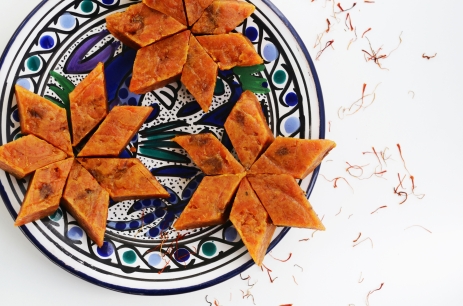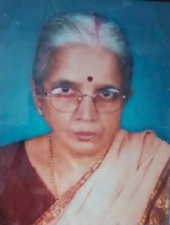
Kitchen Spices
by Smitha Vishwanath
The first time I tried to cook, I stared at my fingers
Then, I conjured Amma up—she in her starched cotton sari
Sitting on the kottemane her sari raised to the knee
Her legs parted on either side of the oralu kallu*
Mamma cooked well
But I liked Amma’s better
So what if she made only the local cuisine
Unlike Mamma, who could whip up a multicuisine feast at the drop of a hat.
Mamma never let me in; she told me I got in the way
But Amma, she let me watch her.
As she conjured up a meal
She looked like she were dancing—
the way she emptied a plate full of grated coconut
in to the well of the grinding stone; the way her wrist moved,
as she wielded the pestle—round and round
It looked like the earth spinning on its axis,
and the way she daintily picked the dried, red chilies
in hamsaasya hasta mudra**
How many? I would ask her
“Six or seven,” she’d say, dropping them into the granite womb
On the bed of white coconut
Then came the golden beads of coriander
“Eshtu***, Amma?” I’d ask
“Ishtu****,” she’d reply, pointing to her fist,
A network of plump veins showing through her gossamer skin
The seeds fell like drops of rain in the basin
along with half an onion, two garlic pods, a finger of ginger,
a bark of turmeric and a pebble of tamarind.
Then came the secret ingredient; she swore by it.
It rested in a white ceramic jar in the corner
“This,” she’d say, “does the magic.”
And pull out its contents in the cup of her palm.
And wave it with the flourish of a magician under my nose—
pearls of roasted mustard seeds, peppercorn, fenugreek, and cumin,
before sprinkling it into the crater.
Crunch, grind, squelch.
The pestle gyrated fluidly in her hand.
And I’d watch in awe, the spices transform
into a smooth, flaming orange paste
“It’s your hands that have the magic, Amma,” I’d say
“Mine can never be as good.”
And she’d reply, in her confident, quiet way,
letting the pestle rest on the edge of the stone
while she scooped out the ground masala with a sweep
“Yours will too. You’ll see.
The whorls on your fingers are like mine.”
REFERENCES:
*orala kallu: grinding stone used in the old days
**hamsaasya hasta mudra: touching index finger to thumb
***Eshtu: how much
****Ishtu: this much
Amma: grandma
Mamma: mother
“Kitchen Spices” was published by SpillWords Press in 2022.
PHOTO: Indian spices by Ratul Ghosh on Unsplash.
NOTE FROM THE AUTHOR: This poem was first published by SpillWords Press under the title, “Grandma’s cooking.” I wrote the poem for the prompt “Kitchen spices” during NaPoWriMo. It was written in memory of my grandma, whom I fondly called “Amma.” September 8, 2023 marked the third year anniversary of her passing.

ABOUT THE AUTHOR: Smitha Vishwanath is a banker turned writer. She began her writing journey in 2016 through her blog. Thieving Magpies, Spillwords Press, Silver Birch Press, Borderless Journal, and Rebelle Society have published her poetry. In 2019, her poem, ‘Omid,” was nominated for Best of the Net and her poems, “Do you have dreams?” and “Forgotten,” were given special mention in NaPoWriMo, 2021 and 2022, hosted by Maureen Thomson. She was awarded the Reuel International Prize for poetry during the NaPoWriMo month by TSL. In 2019, she co-authored a book of poetry, Roads: A Journey with Verses, which received positive reviews. Smitha’s writing is peppered with the lessons learned from the plethora of invaluable experiences that come from having lived in India, UAE, and Iran, worked in a multi-cultural environment, and travelled widely. She resides in Dhaka, Bangladesh, with her husband and two daughters. When she is not writing, you can find her painting, traveling, or sharing reviews of books she has read on Goodreads, Amazon, and her blog. Her debut novel, Coming Home, was released in March 2023 and is currently available through Amazon. Find her on Facebook, Instagram, and Twitter (X).





![Maa & I on a family trip in Puri [April 2018]](https://silverbirchpress.files.wordpress.com/2024/03/maa-i-on-a-family-trip-in-puri-april-2018.jpg?w=257&h=458)



















